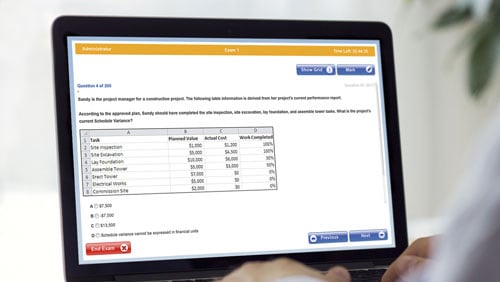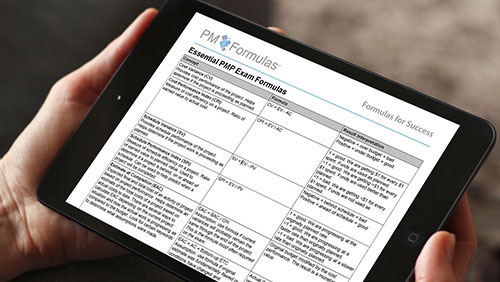You have reached the old version of this article. Click below to read the updated version:
The updated version is longer, more in-depth and offers more specific guidance on how to prepare for your PMP exam. It is therefore recommended that you read the new article.
Are you looking for a way to becoming a Project Management Professional (PMP)®? Look no further. Here are 10 steps that will show you how to become a certified project manager.

Let's jump right in!
Continue Reading
12 Most Popular PMP® Study Materials for your PMP Exam Prep
 If you are about to start studying for your Project Management Professional (PMP)® exam, you’ll want to make sure your toolkit is bursting with things to help you on the journey to becoming a PMP®. There are so many options to consider when looking at the study materials on the market that it can be difficult to know where to start.
If you are about to start studying for your Project Management Professional (PMP)® exam, you’ll want to make sure your toolkit is bursting with things to help you on the journey to becoming a PMP®. There are so many options to consider when looking at the study materials on the market that it can be difficult to know where to start.
First, don’t be overwhelmed by the choice. The tools that your colleagues and classmates are using may not be the right ones for you. How do you learn best? Choose pmp study materials that will help you prepare for PMP certification in a way that best suits your learning style. You’ll also want to consider your budget. Don’t feel that you have to buy really expensive exam preparation tools. There are products on the market that are both efficient and cost effective. Reading what other students have to say about the study tools they use can also be helpful: check out independent review sites.
Continue Reading
Correct PMP® Eligibility Title if not a Project Manager
 Are you wondering if you can take the Project Management Professional (PMP) ® exam or not?
Are you wondering if you can take the Project Management Professional (PMP) ® exam or not?
You might have various concerns regarding the PMP® exam such as your designation, size of the organization and benefits of PMP certification in career development. Well, then here I am to address some of your concerns and help you develop an in-depth understanding about how the PMP certification can be beneficial for you.
Continue Reading
How To Handle Your Actual PMP® Exam Day
 You have come this far and after weeks of study, you are now ready to take your Project Management Professional (PMP)® exam. You know you have prepared yourself physically and mentally and that you are ready to tackle the exam questions confidently. And that is the attitude needed to forge ahead - an attitude borne out of determination to pass this important exam, so positive that others can actually feel it from you.
You have come this far and after weeks of study, you are now ready to take your Project Management Professional (PMP)® exam. You know you have prepared yourself physically and mentally and that you are ready to tackle the exam questions confidently. And that is the attitude needed to forge ahead - an attitude borne out of determination to pass this important exam, so positive that others can actually feel it from you.
But as in any endeavor, you will need to be ready for the actual battle - in this case, the PMP exam. The day before, you should have a good rest and eliminate any distractions. For instance, be sure that you take a day-off from your work on the day of the exam. The last thing you need is be concerned with issues regarding your job. Empty your mind of these kind of distractions for the exam.
Here are some PMP® exam tips on how to handle your actual PMP exam day:
Continue Reading
 Everyone has different ways of studying for the Project Management Professional (PMP)® certification. You may carry A Guide to the Project Management Body of Knowledge (PMBOK® Guide) around with you, or use flashcards. You may join your local Project Management Institute (PMI)® Chapter and study in a group. Whatever your study path, someone has been there before you.
Everyone has different ways of studying for the Project Management Professional (PMP)® certification. You may carry A Guide to the Project Management Body of Knowledge (PMBOK® Guide) around with you, or use flashcards. You may join your local Project Management Institute (PMI)® Chapter and study in a group. Whatever your study path, someone has been there before you. One of the best study tools for the Project Management Professional (PMP)® are PMP® exam sample tests. As you are preparing for the PMP exam you are in fact preparing to take a 200-question multiple choice exam. And just as if you were an Olympic athlete, taking this exam becomes your sport and you have to practice it. Again and again. However, instead of answering someone else’s questions, it is a good thing to create your own.
One of the best study tools for the Project Management Professional (PMP)® are PMP® exam sample tests. As you are preparing for the PMP exam you are in fact preparing to take a 200-question multiple choice exam. And just as if you were an Olympic athlete, taking this exam becomes your sport and you have to practice it. Again and again. However, instead of answering someone else’s questions, it is a good thing to create your own. The Project Management Professional (PMP)® credential offered by Project Management Institute (PMI)® is a great asset for any project manager. It is a sign that you understand the roles and responsibilities of a project manager, and have the experience and expertise required to do your job well. As well as being practically useful for your day job, the credential is also a signal to employers that you take your role seriously and have spent the time investing in professional development.
The Project Management Professional (PMP)® credential offered by Project Management Institute (PMI)® is a great asset for any project manager. It is a sign that you understand the roles and responsibilities of a project manager, and have the experience and expertise required to do your job well. As well as being practically useful for your day job, the credential is also a signal to employers that you take your role seriously and have spent the time investing in professional development. By Margaret Meloni, PMP
By Margaret Meloni, PMP One of the most critical skills of a Project Management Professional (PMP)® is the ability to cut through the jungle of “undergrowth” of extraneous details and identify the true challenges. The PMP® certification exam may at first look as if it is full of confusing questions and immaterial detail but it’s designed in such a way that it also tests this crucial area of judgment. If you can cut through the noise and identify the important facts, you’ll do fine on the exam.
One of the most critical skills of a Project Management Professional (PMP)® is the ability to cut through the jungle of “undergrowth” of extraneous details and identify the true challenges. The PMP® certification exam may at first look as if it is full of confusing questions and immaterial detail but it’s designed in such a way that it also tests this crucial area of judgment. If you can cut through the noise and identify the important facts, you’ll do fine on the exam.
 Daniel Hendling, PMP about the PMI® Code of Ethics and Professional Conduct.
Daniel Hendling, PMP about the PMI® Code of Ethics and Professional Conduct.
 If you are about to start studying for your Project Management Professional (PMP)® exam, you’ll want to make sure your toolkit is bursting with things to help you on the journey to becoming a
If you are about to start studying for your Project Management Professional (PMP)® exam, you’ll want to make sure your toolkit is bursting with things to help you on the journey to becoming a  Are you wondering if you can take the Project Management Professional (PMP) ® exam or not?
Are you wondering if you can take the Project Management Professional (PMP) ® exam or not? You have come this far and after weeks of study, you are now ready to take your
You have come this far and after weeks of study, you are now ready to take your 

